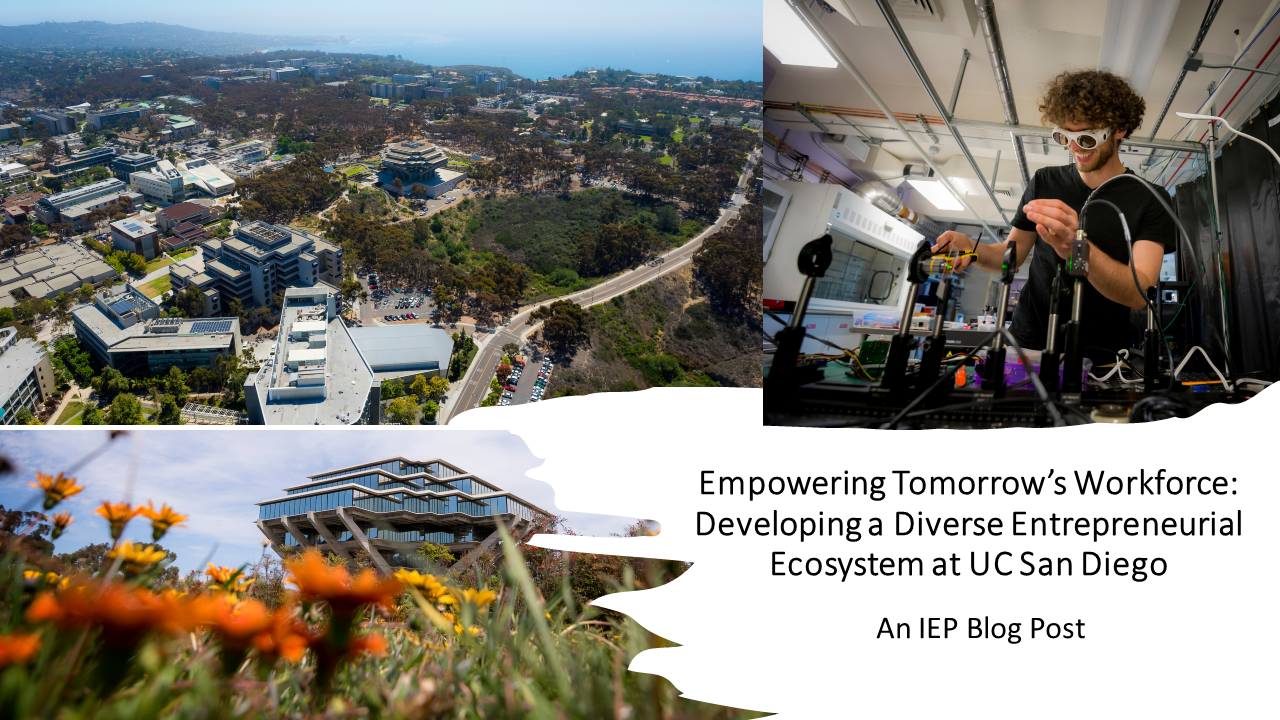Empowering Tomorrow’s Workforce: Developing a Diverse Entrepreneurial Ecosystem at UC San Diego
By: Rachel Hommel, Marketing Strategist, UC San Diego Office of Innovation & Commercialization

This article is included as part of APLU’s Innovation and Economic Prosperity Universities Designation and Awards Perspectives Blog. Read other articles around strategies, programs, and impact of APLU’s IEP designees at www.APLU.org/IEPBlog. Earn APLU’s IEP designation. Learn more at www.APLU.org/SeekIEP.
At UC San Diego, our mission of education, research and service is strongly tied to our region’s
success, developing tomorrow’s workforce and technologies to provide solutions to society’s
challenges. Looking beyond today’s challenges to innovate, collaborate and create tomorrow’s
solutions, the Innovation & Economic Prosperity Universities (IEP) designation helps us forge
and sustain shared economic and social prosperity within the San Diego region with substantive
outcomes over the last three years.
The recognition is the result of a nearly yearlong process that convened economic engagement
experts from across the campus. Together, the group gauged contributions to the regional
economy, ranging from startup creation to job growth, and community health clinics to millions
of dollars in procurement from small businesses based in San Diego County and regional
partners, identifying ways to grow collaboration and develop a shared vision for economic
engagement, with Chancellor Khosla’s service on the APLU committee fueling the desire to
highlight collective campus entrepreneurial impact.
Collaborations between companies and universities are critical drivers of the innovation
economy. These relationships have long been a mainstay of corporate research and development
(R&D) — from creating the knowledge foundations for the next generation of solutions, to
serving as an extended “workbench” to solve short-term, incremental problems, to providing a
flow of newly minted talent. As many corporations look to open innovation to augment their
internal R&D efforts, universities have become essential partners. Indeed, companies and
government entities now look to universities to anchor an increasingly broad set of innovation
activities, especially those grounded in engaging with regional/national innovation ecosystems.
Our Innovation Sprints program is designed to bring multidisciplinary teams of students together to create disruptive solutions to real-world challenges provided by regional and national partners (e.g. large corporations, small and medium enterprises, governmental agencies/ municipalities and non-profit organizations.) The program is open to all students seeking a dedicated focus on entrepreneurship, bringing cross-functional and interdisciplinary teams of students together to build new approaches, grow new businesses and create new realities.
The world around us is continuously evolving, and we are faced with a remarkable number of
challenges, as well as an important set of opportunities to build new approaches, grow new
businesses, and create new realities. Participants in the Innovation Sprints are encouraged to
think broadly about the disruptions and challenges they see around them, those that affect a large
number of people, and those that provide the greatest opportunity for impact.
Additionally, our self-study coupled with California State Funds (AB2664) applied toward the
FIRE (Fueling Innovation for a Robust Economy) program helped us form key relationships
across dispersed departments as well as research areas. The coordination and networks
established in the self-study combined with state resources contributed to a strong foundation for
catalyzing work around key themes, especially in response to the COVID-19 pandemic, allowing
us to bolster our IEP designation to maximize the impact of our research regionally and
worldwide.
Our key takeaway: cross-campus coordination of various innovation elements strengthened
invaluable collaborative relationships, both on and off campus, for the times when we need it
most, such as the current COVID crisis. This approach allowed us to rapidly put a
contact-tracing challenge together. XYO Foundation is giving students access to their software
development tools on the blockchain. Teams of students from across campus are using those
tools to develop solutions to contact-tracing challenges, giving the students an experience that
will better prepare them for their careers.
We made significant resource investments in technology development programs such as Accelerating Innovation to Market (AIM) and continue to support Galvanizing Engineering in Medicine (GEM). Programs like these are designed to promote collaboration between industry and academia and to advance the commercially focused development of emerging technologies. The IEP self-study helped us consolidate the value of a network that makes mentoring, funding and additional regional resources available in advancing ideas from lab to market.
One project that has benefited from cross-campus coordination and support from programs like
AIM is James Friend and his work on ventilators and swab rapid prototyping at the Qualcomm
Institute. The multidisciplinary values and approach promoted by the IEP designation process
facilitated bringing everyone together and gathering support for the ventilator development,
resulting in an application for EUA approval and commitments to manufacturing units from local
companies.
The foundation developed through the IEP process has strengthened our ties with the community,
allowing us to quickly develop the Civic Resilience Partnership, a collaboration of academic
institutes, military installations and industry designed to streamline prototype and solution
development in response to times of crisis, in response to the COVID crisis. The objective of the
Civic Resilience Partnership is to strengthen the resilience across respective markets, enhance
regional and local economies, and assure the nation has a dynamic capacity to accelerate
technology and create an agile workforce for national security that can be used to rapidly
respond in a time of crisis.
This article is included as part of APLU’s Innovation and Economic Prosperity Universities Designation and Awards Perspectives Blog. Read other articles around strategies, programs, and impact of APLU’s IEP designees at www.APLU.org/IEPBlog. Earn APLU’s IEP designation. Learn more at www.APLU.org/SeekIEP.
- IEP



Stay Connected
X (formerly Twitter)
Facebook
YouTube
LinkedIn
RSS